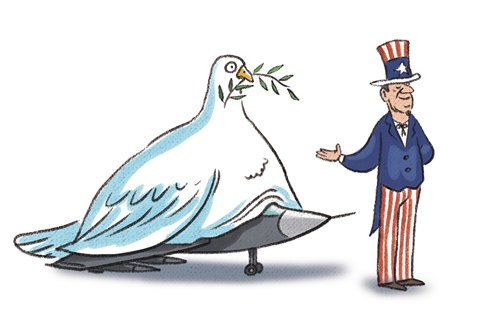HOME >> OPINION
US war mentality should not be taken lightly
By Li Haidong Source:Global Times Published: 2019/5/19 19:33:40

Illustration: Liu Rui/GT
The US is sending the USS Abraham Lincoln carrier strike group and a bomber task force to the Persian Gulf. Analysts said the deployment signals US military operations against Iran.
After the Cold War, the US often threatened to launch military action against other nations. It's not exaggerated to say that the US has remained in an endless state of war. These wars are often interpreted as attempts to acquire things like oil or a more favorable strategic position.
However, US long-term strategic capability over launching wars is overestimated while its national belligerence is underestimated.
The wars that the US has participated in are not related to the country's major strategic interests. This has been particularly true since the end of the Cold War, with examples ranging from the civil war in Somalia in 1993, Kosovo in 1999, the war in Afghanistan beginning in 2001, the Iraq War from 2003 to 2011, the war in Libya in 2011, and Syria since 2011.
The US has offered a variety of explanations for their military actions, like the transformation of UN functions, humanitarian intervention, large-scale counter-terrorism, the elimination of weapons of mass destruction and forced democratic reforms. With little or no major strategic interests involved, US participation in these wars is random, and controversial.
US easy involvement in war is associated with its concept of security. War and expansion are inherent to its diplomacy, behind which lies the logic - security stem from external environment, or in another word, the US believes that its security depends fundamentally on the Americanization of the outside world.
Since the War of Independence, the US has believed it bears the mission to reform or overthrow weaker nations or political forces which fail to Americanize.
Americans killed Indians during the country's Western expansion in the 19th century, seized and divided Mexico, and annihilated Spanish colonial rule.
During the Cold War in the 20th century, the US spent 14 years in Vietnam war, which had almost nothing to do with the US strategic interests.
For countries with superior or equal strength, the US has shown respect for their special interests and has tried to resolve conflicts through negotiations, such as its policy with British forces in North America in the 19th century, and its policies with the former Soviet Union in the 20th century.
When deep differences emerge, the US is likely to use force against weak countries. But with stronger nations, it has always been more cautious.
The strategy made the US get involved in wars throughout the world, while simultaneously creating fragile relationships with major powers.
Unlike most countries, which would not resort to war when their major core interests were not jeopardized, the US is fascinated with Americanizing the world and keen on waging or participating in wars.
The pursuit of geographically strategic advantages, or oil reserves, is not enough to explain US war obsession.
Since the US gained its independence, its behavior has not been in harmony with the world. Traditionally, the US is never satisfied with the status quo.
Though irresponsible interventions in various regions, the US has created a stigma for itself. Wars in Iraq, Syria, Libya, and Afghanistan resulted in chaos, countless civilian deaths, and large-scale refugee migration.
US decision-making over wars was obviously emotional and irrational after the Cold War. Some mainstream US media tend to exaggerate international events with a pre-existing ideological narrative. Under these circumstances, decision-makers are likely to make wrong decisions.
The high degree of "polarization" in US domestic politics makes it easier for policymakers to alleviate or shift US internal crises through war. This adds to their impulsiveness and arbitrary propensity for war.
When the US is unhappy with the international order, it will attempt to transform other countries through war. Such practices have created profound divisions and chaos in other nations.
After an in-depth and systematic study on the history of US diplomacy, Robert Kagan, a well-known American scholar, understood the belligerent and aggressive traditions of the US. He concluded that the US is a dangerous nation. It may sound harsh, but it reveals the essence of US diplomacy.
The author is a professor with the Institute of International Relations, China Foreign Affairs University. opinion@globaltimes.com.cn
Posted in: VIEWPOINT